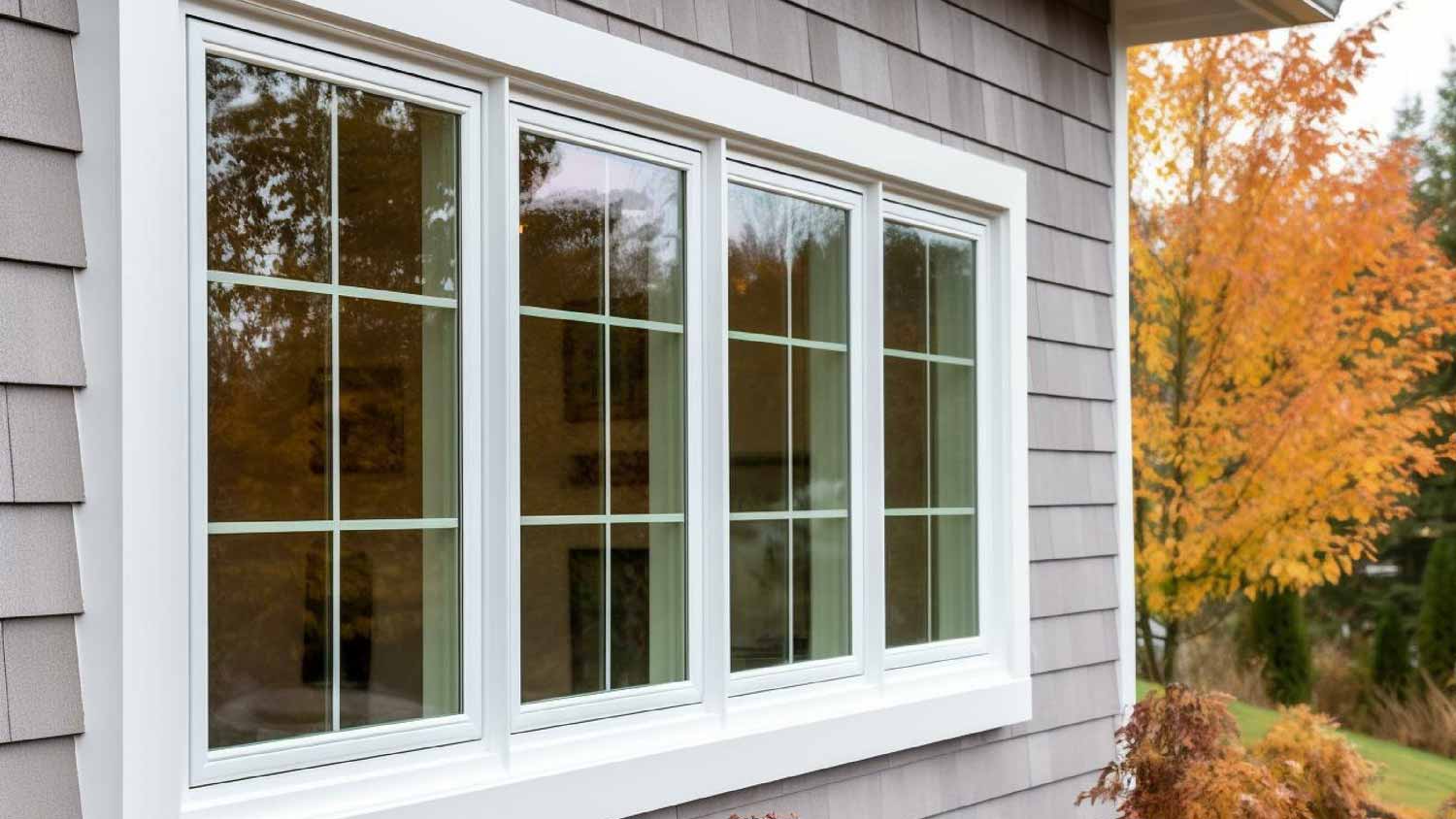What Damage Can a Hurricane Cause? What to Know and How to Recover
Get ready for hurricane season with these tips


High winds, heavy downpours, and storm surges cause damage during hurricanes.
Hurricanes can damage foundations, roofing, walls, interiors, home systems, utilities, and more.
The National Hurricane Center rates storms from 1 to 5, depending on wind speed.
Secure and strengthen your home’s structure before a storm hits.
After a hurricane, prioritize your safety, then report and repair the damage.
If you live in a hurricane-prone area, you know these storms can cause catastrophic damage. They bring destructive winds and flooding to wide swaths of coastal locations. While you can do nothing to stop them, understanding the type of damage hurricanes cause will help you plan for and recover from them.
Common Property Damage Hurricanes Can Cause
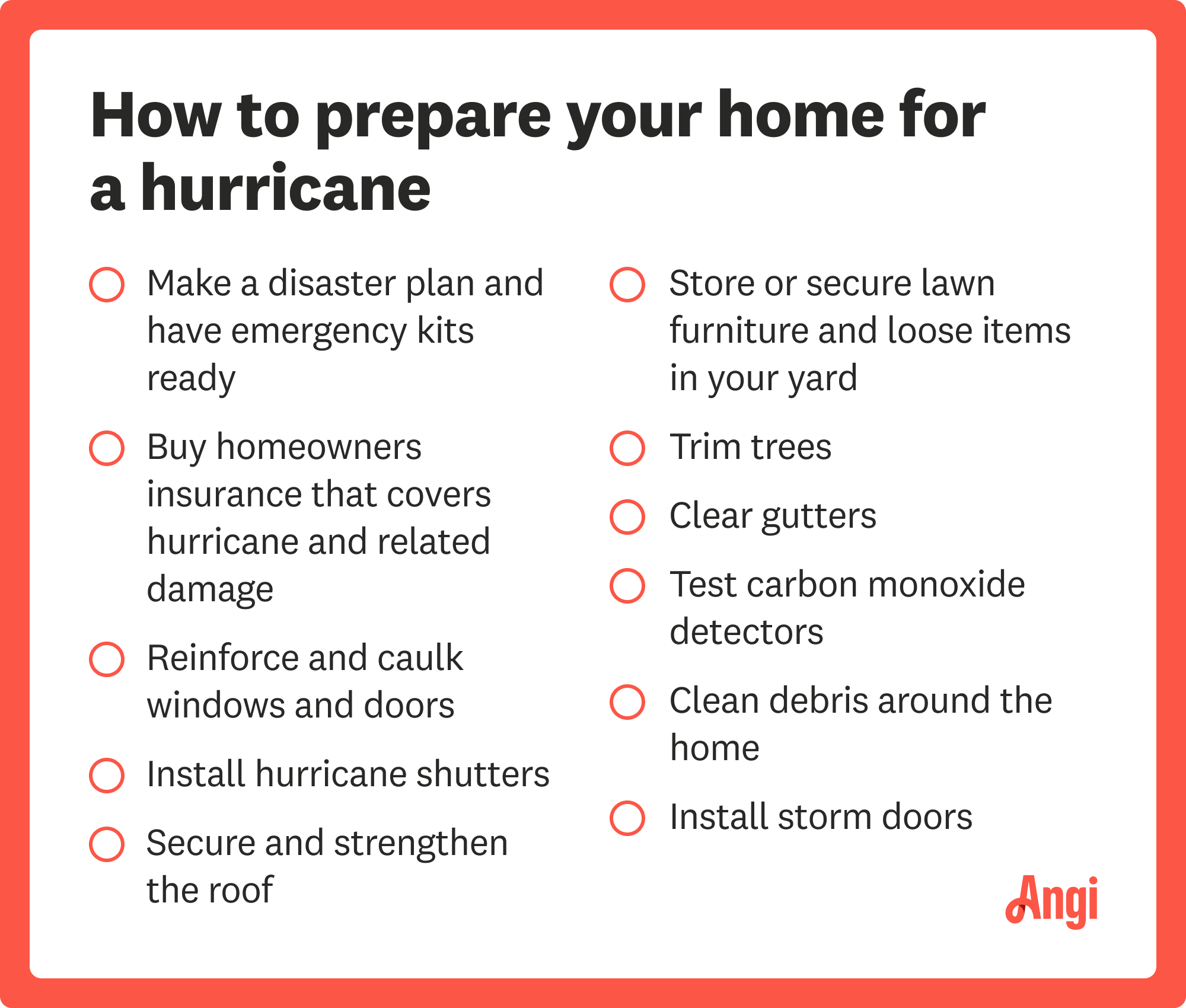
After a hurricane, it’s natural to want to go home and start the recovery process—but always follow directions from local authorities and wait until they give you specific clearance to enter or stay in your house. Review and follow safety guidelines from the U.S. Centers for Disease Control and Prevention (CDC) after the storm and during cleanup.
Here are the most common ways hurricanes impact houses and other buildings so you’ll know what to watch for after the storm has passed.
Wind Damage
With sustained wind speeds over 74 miles per hour, hurricanes can tear off shingles, rip apart siding, blow in windows and doors, and collapse walls and roofs. In the worst storms, the wind and debris it carries will completely tear down homes.
Flood Damage
From storm surges to torrential downpours, flooding is second only to wind for causing hurricane damage. When you pair the two, it’s easy to see why homes, buildings, vehicles, and landscaping can’t escape damage from even minor cyclones, tropical storms, and hurricanes.
Flood damage can look like warped drywall, loose or buckling flooring, roof and foundation cracks, broken and frayed electrical wires, damaged appliances, mold and mildew growth, clogged or overflowing septic systems, and contaminated water wells.
Structural Damage
Any damage to your home’s foundation, roof, walls, or other major components is considered structural. It can be minor to major in scope, but hire a structural engineer to check it out and ensure your home is safe. Repair structural problems as soon as possible to keep your house in good condition and avoid future issues.
Foundation Damage: Hire a foundation contractor to inspect your home for shifting, cracking, water intrusion, and other issues. Your whole home sits on the foundation, so it needs to be strong to keep it safe.
Roof Damage: Wind, downpours, hail, and debris can damage and tear off shingles, overflow or break gutters, and damage the roof’s sheathing or framing. This can lead to leaks, holes, and even roof collapse. Local roofing contractors can inspect, repair, and replace roofs after hurricanes.
Wall Damage: From outer and foundation walls to drywall and load-bearing walls, it’s no surprise that hurricanes can damage your home’s inner and outer support systems. Wind, water, and shifting soil can cause damage or collapse. Watch for visible water damage, bowing, warping, leaning, and other signs of wall failure.
Home Systems Damage
Almost every home system, from electrical and plumbing to HVAC and appliances, is vulnerable to damage during severe storms and hurricanes. Flooding, impact from debris, and power surges are the culprits. Never use electrical systems or appliances if water is present. Instead, call an electrician to verify it’s safe to use them.
Utility Damage
Utilities like power, water, and sewer take a beating during hurricanes. Whether you rely on public utilities or have private systems, you’ll likely feel the storm's impact. Be prepared to live without power and water for days to weeks—or possibly longer—after a hurricane.
Interior Damage
Even if the damage is minor, water intrusion can lead to mold and other issues. This can impact your drywall, flooring, other building materials, and furniture, which will soak up water. If the inside of your home gets wet, call a local water damage restoration company right away to remove all of the moisture and repair any visible damage.
How Does a Hurricane Damage Homes?
Hurricanes bring high winds, flooding, and torrential downpours, and they can spawn tornadoes, giving them the strength of several storms in one. It’s common to experience uprooted trees, damage from flying debris, home flooding, lightning strikes, and wind damage.
Hurricane Strength Categories
The National Hurricane Center classifies hurricanes on a scale of 1 to 5, depending on the storm’s maximum sustained wind speed. It estimates property damage based on wind shear (strong winds), but rain and storm surges also contribute to the impact.
| Hurricane Category | Wind Speed (Mph) | Impacts |
|---|---|---|
| 1 | 74–95 | Some minor damage, power outages, tree limbs down |
| 2 | 96–110 | Major, extensive damage to home exteriors, trees toppled, power lines downed |
| 3 | 111–129 | Devastating damage to home walls and roofs, roads blocked, no electricity or water for days or weeks |
| 4 | 130–156 | Catastrophic damage, walls and roofs destroyed, trees uprooted and snapped, power outages for weeks to months |
| 5 | 157+ | Homes completely destroyed, major debris piles, roads impassable, communities uninhabitable for weeks to months |
Steps to Get Ready for a Hurricane
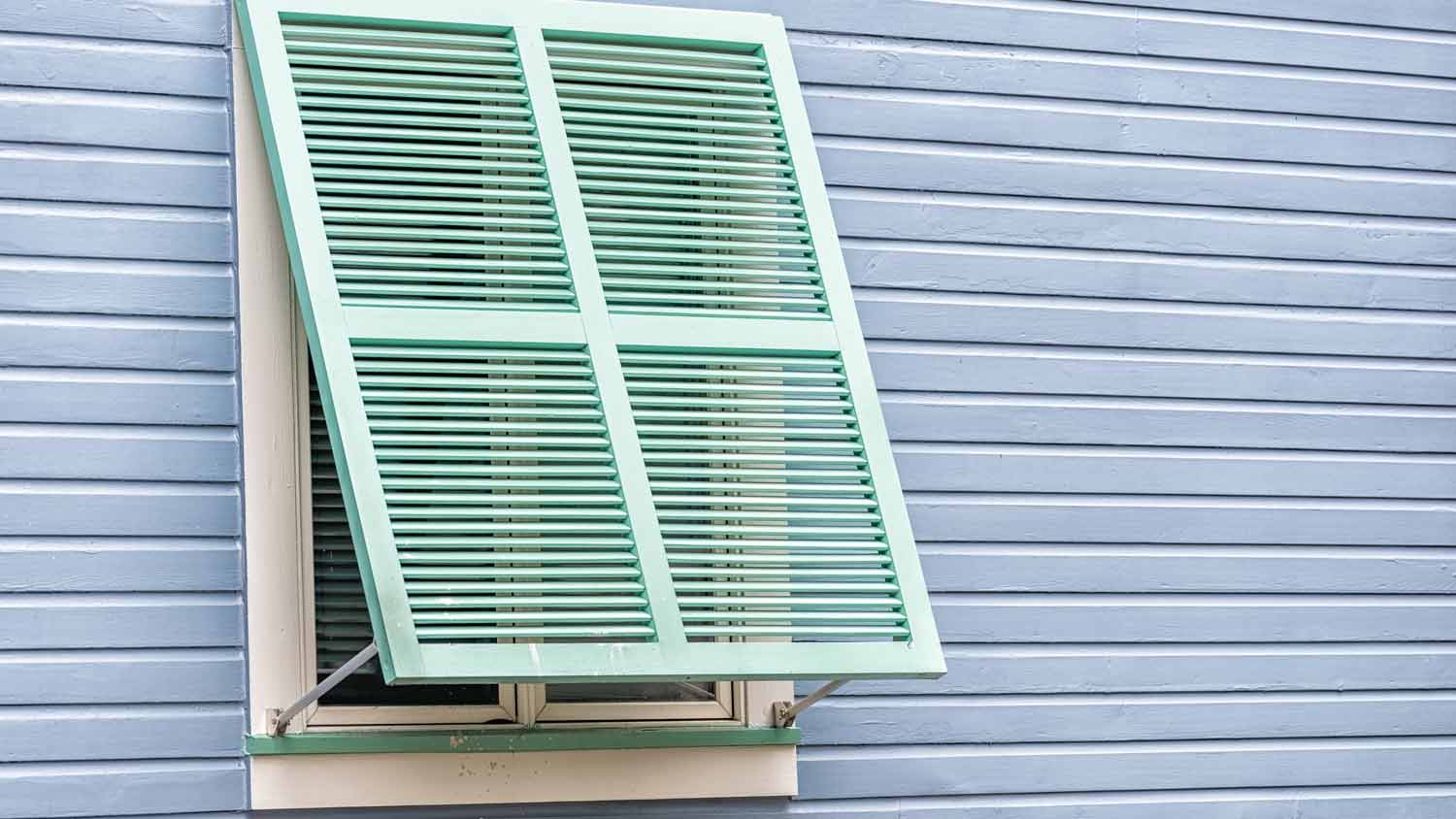
Wondering how to hurricane-proof your home? We’ve got tips to get you started to protect your house and family.
Make a plan: If you live in a hurricane-prone coastal area, think about where you’ll evacuate, what you’ll take, and how you’ll stay in touch with loved ones.
Prepare an emergency kit: Many locations lose power, water, and travel access after a storm. Keep essential supplies like food and water, flashlights, batteries, communication devices, and medication on hand.
Purchase hurricane insurance: This will not prevent damage but can help you get back on your feet after a storm. Get flood insurance and other relevant policies on your home, vehicle, and belongings.
Reinforce doors and windows: Doors and windows are the weakest parts of a home. Invest in high-quality materials, install impact windows or hurricane shutters, deadbolts, locks, seals, and other protective measures. Upgrade or reinforce garage doors so they can handle strong winds. For extra safety, learn how to board up windows for a hurricane and have precut marine plywood on hand.
Secure the roof: Not all roofs are attached tightly enough, leaving them vulnerable to wind damage or even being torn off. Make sure your roof is tightly installed and secured to your home’s walls. If it isn’t, you can hire a roofer to add straps or clips to strengthen it.
Clear gutters: Heavy rains can overwhelm gutters, causing overflow, gutter damage, and water intrusion in the home. Keep your gutters clean and check them before storms.
Secure loose objects: Lawn furniture and decorations act like missiles during hurricane-force winds. Store them in your garage or basement before storms arrive.
Trim trees: Even low-grade hurricanes create strong winds that can tear off branches and bring down trees. To prevent additional damage, keep trees trimmed and remove dead, dying, or low-hanging branches. Hire a tree trimming pro for trees requiring a ladder and if your trees are close to a structure or power line.
Hire a pro: You can do a lot yourself, but hiring a professional to help you prep for possible storms is worth the investment. For example, hurricane shutter companies near you can recommend the best products to protect your windows.
Follow warnings: Evacuate if instructed to do so by the authorities, and follow advice from public officials. Sheltering in place during less severe storms is possible, but riding out a severe storm in a home can be dangerous. You’ll be safer in an evacuation shelter or somewhere outside the evacuation zone. FEMA has more details about how and where to evacuate.
Find hurricane preparedness suggestions, checklists, and assistance from the American Red Cross.
What to Do Immediately After a Hurricane
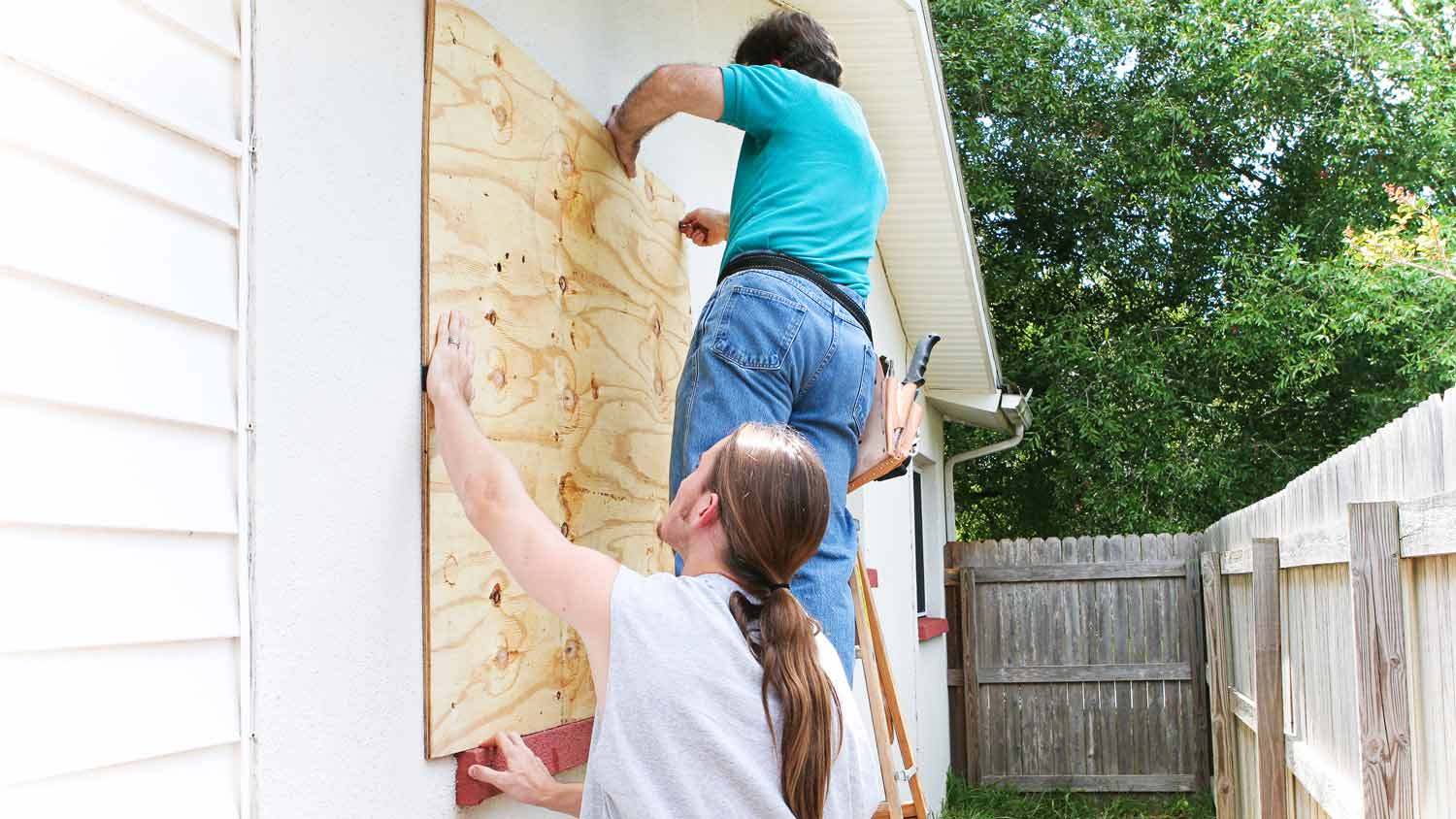
After a major storm, you might be in a hurry to return home. Here’s what to know before rushing back:
Only return when it’s safe: Hazards remain after storms have passed. Don’t drive on flooded roads, and stay away from downed power lines and trees. Only return home when local officials say it’s safe. Coming back too early may leave you without electricity, water, and emergency services, and it can stress local resources.
Prevent injuries: Avoid fallen electrical lines and shock hazards inside and outside. Wear protective clothing—including long pants and long sleeves, work gloves, boots or heavy-duty shoes—and safety gear, like eye and hearing protection, when cleaning up.
Prevent carbon monoxide poisoning: Gas-powered generators and those with internal combustion engines expel dangerous exhaust gases. If you use a generator, ensure you have working CO detectors in your home, and never run generators indoors or under open windows. Some types of portable generators, like solar or battery-powered models, may be used inside, but you must use them exactly as instructed by the manufacturer.
Find and report damage: Inspect your property, take photos or videos, and write notes for all damage. Submit claims to your insurance company as soon as possible.
Repair damage: Contact construction professionals to inspect and repair damage. Protect yourself by hiring licensed, insured, and local companies that offer quality work, fair pricing, and written warranties.
Get recovery help: Apply for assistance from FEMA, which offers emergency assistance, grants, and rebuilding help for disaster survivors.
"Before a storm, ensure your family knows the location of gas and other utility shut-off switches and valves in case you need to evacuate. Familiarize yourself with emergency routes and keep printed copies in your car's glove compartment and emergency supply kits. Know where shelters are in your area, and make sure your car has a full tank of gas."
— Allen Baler, CEO, 4Patriots, Nashville, Tennessee
Frequently Asked Questions
A hurricane can take down a house, but most well-built modern homes can withstand an average hurricane. Houses are more likely to fail during strong hurricanes and if they’re older, poorly built, or already have structural problems. Strong winds can blow off weak points like the roof and windows, giving the hurricane winds an opening to do more damage. Walls may also collapse under the force of high winds and pressure.
Homes need solid construction to survive a hurricane, including these parts:
A secure foundation at the right elevation for your home’s flood threat level
Hurricane straps to secure your home’s foundation
Waterproof basement sealant or rubberized sheeting that directs water away from the foundation
A strong, well-attached roof that’s firmly secured to the framing
Shutters or roll-down window protectors that you can close outside to prevent broken windows
A garage door bracing system to keep high winds from caving in or tearing off the door
Deadbolts to keep your exterior doors in place against wind pressure and floodwater

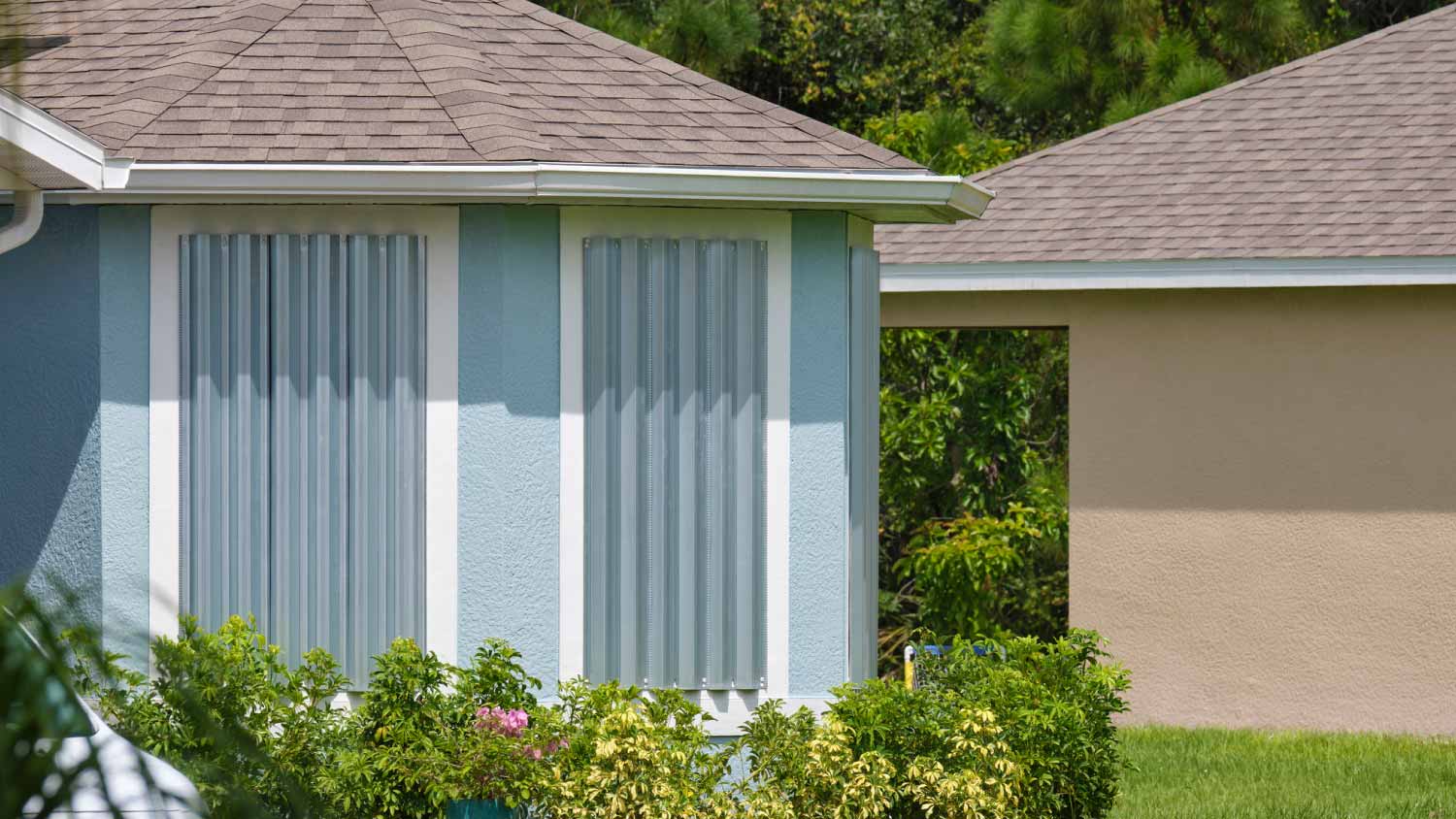



- How to Hurricane-Proof Your Home: 11 Tips for Staying Safe During Storms
- Hurricane Prep Checklist: Everything You Need to Stay Safe
- 4 Tips on How to Protect Windows During Hurricanes If You Live in a Storm-Prone Area
- What to Do If Your Roof Has Storm Damage
- How to Prepare for a Hurricane: 12 Essential Steps
- 9 Hurricane Prepping Tips to Stay Safe in the Storm
- Protect Your Home From Wind Damage in 5 Easy Steps
- What to Do After Water Damage in Your House and Why Act Fast
- 8 Signs of Storm Damage to a Roof and What to Do About It
- Water Damage Restoration Checklist: 8 Steps to Save Your Home After a Flood



